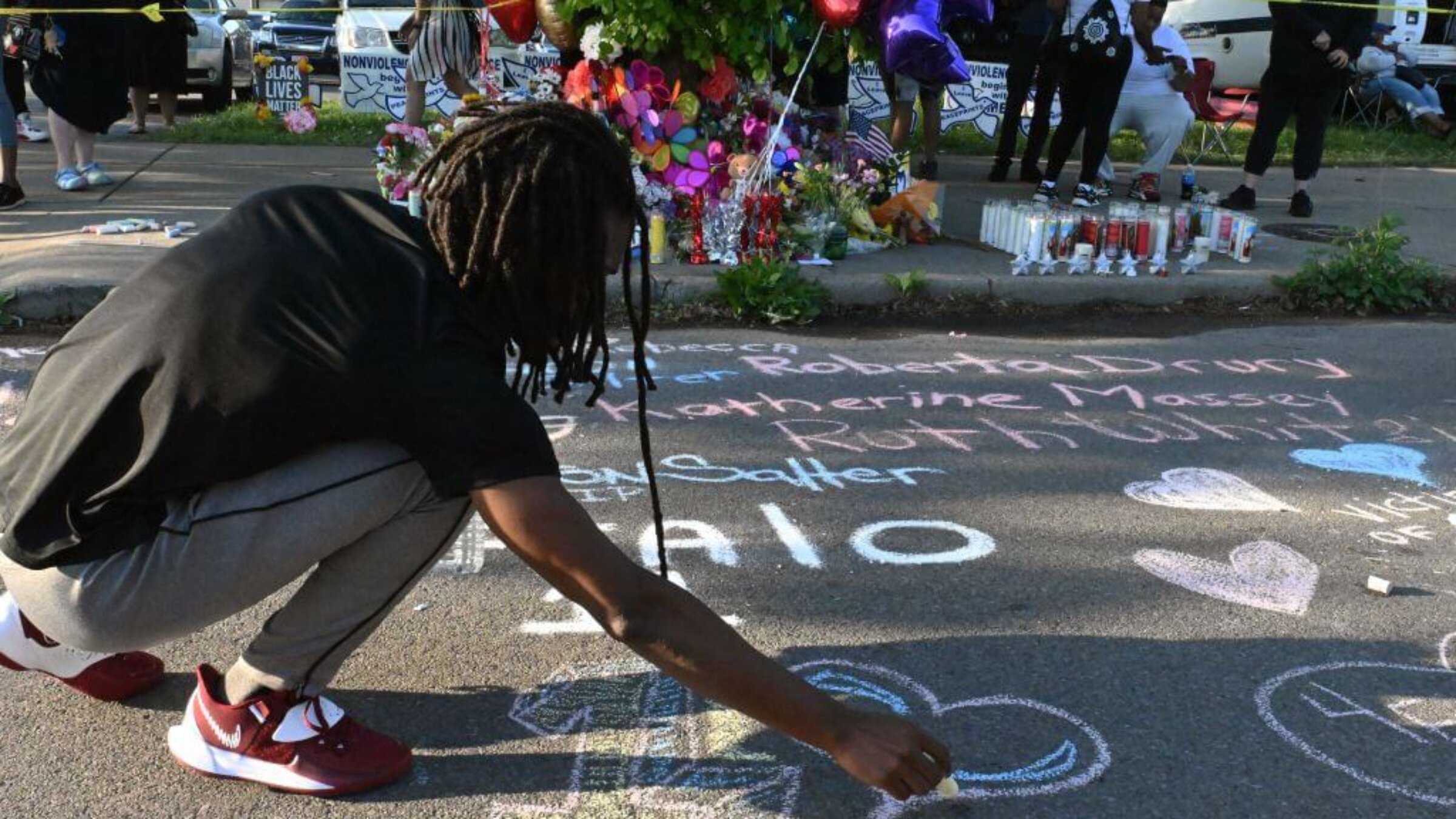It’s not about you: Why the Forward’s article on the anti-Jewish elements of the Buffalo shooter’s screed was offensive
This tragedy was not about Jewish Americans. It was about African Americans and white supremacy.

People leave messages at a makeshift memorial near a Tops Grocery store in Buffalo, New York, on May 15, 2022, the day after a gunman shot dead 10 people. Photo by Usman Khan/AFP via Getty Images
Last Tuesday, the Forward published an article originally headlined, “The Buffalo shooter targeted Black people. But his screed focuses on Jews.” After feedback from several Black Jews, the Forward changed the headline, to address concerns that the article focused on the Jewish community rather than the Black community that suffered the loss of life.
Even though the “but” was removed from the headline, the reader, in the second sentence of the article, encounters the real thesis of this article “…he was targeting Black people. In the diatribe he published to explain his motivations, though, he focuses more on another group: Jews.”
The article briefly mentions, in three short paragraphs, that it was Black people that were targeted and murdered – and the remaining 20 paragraphs focus on the portion of the killer’s rant that targeted Jews. The article quickly moves us through “great replacement theory” and then discusses how all this hatred formed a “potent stew” that effectively begins and ends with antisemitism.
The article pulls on the rhetoric that European-American Jews have always worked in solidarity with racial minority groups in an attempt to situate European-American Jews at the center of this tragedy. Once again, turning a tragedy in the African American community into a discussion about antisemitism. This tragedy was not about Jewish Americans. It was about African Americans and white supremacy.
In the United States, African Americans have been the primary focus of white supremacists. Whether through slavery, Jim Crow, or institutionalized racism, African American people have always been the primary target of white supremacists. Unlike other marginalized groups, African Americans cannot hide their Blackness, making them uniquely positioned to be the victims of terror attacks.
No one denies that other groups are targeted by white supremacists. Mexicans have been murdered in a mass shooting, Muslims are regularly targeted and beaten. Asians have been and are randomly and viciously attacked, and yes, Jews of European descent are, too, in the U.S. today.
If we were honest with each other, we would admit that we are all catching hell out here. But too often, instead of providing one another space to grieve and find support together, we position ourselves in competition with one another. It is not a contest.
The difference is when African Americans are targeted and murdered in the United States of America, there is little public outcry except from other African Americans. Take for instance the police killings of Black men and women before George Floyd. How many times did you hear that Michael Brown was probably stealing the cigarillos – which turned out to be his – in the first place?
In the United States, African Americans are not viewed as vulnerable. Due to the whitewashing of history, African Americans are portrayed as these superhuman beings that went through slavery and later became wealthy athletes and hip-hop celebrities. African Americans are portrayed as resilient and strong, and in the extreme as angry and dangerous.
No room is made for their grief, their loss, their sorrow. Who outside of the Black community stops to ask, what does the African American community need to heal from this recent attack, let alone half a millennium’s worth of violence?
That is why this article and others like it were so offensive. During a time of mourning for African Americans, they not only centered European-American Jews while erasing Jews of color, but also ignored the fact that there is a population within European-American Jewry that participates in white supremacy.
When in 2022 African Americans are still encountering European-American Jews that are still stating they have never seen a Black Jew or asking Black Jews how they could be Jewish, or stopping them as they enter the synagogue, European-American Jews need to turn the inquiry inward to ask how they are contributing to the problem.
They should not write articles that appropriate a terror attack against African Americans as an excuse to center European-American Jews and portray them as the ultimate victim. They should, instead, consider the feelings of African American Jews and what they may be experiencing in this moment of grief.
In the 1996 movie “A Time To Kill,” Matthew McConaughey in his closing argument makes the following statement: “Can you see her? Her raped, beaten, broken body…left to die. Can you see her? I want you to picture that little girl. Now imagine she’s white.”
I ask you, too, to imagine the 10 Black individuals that were shot down while simply shopping for groceries. Imagine their terror. Imagine them being confronted by a white supremacist that wants them and people who look like them to be erased from the earth, regardless of his motivations.
Imagine the fear they felt when they were confronted with that gun. Imagine them being shot as they held onto a shopping cart or held groceries. Imagine their final thoughts for their spouses, their children, their parents. Imagine how their entire world was shattered because, as the Talmud tells us, when we kill one life, we kill an entire world.
Because Black Lives Matter — just as much as Jewish lives do.
To contact the author, email [email protected]
























